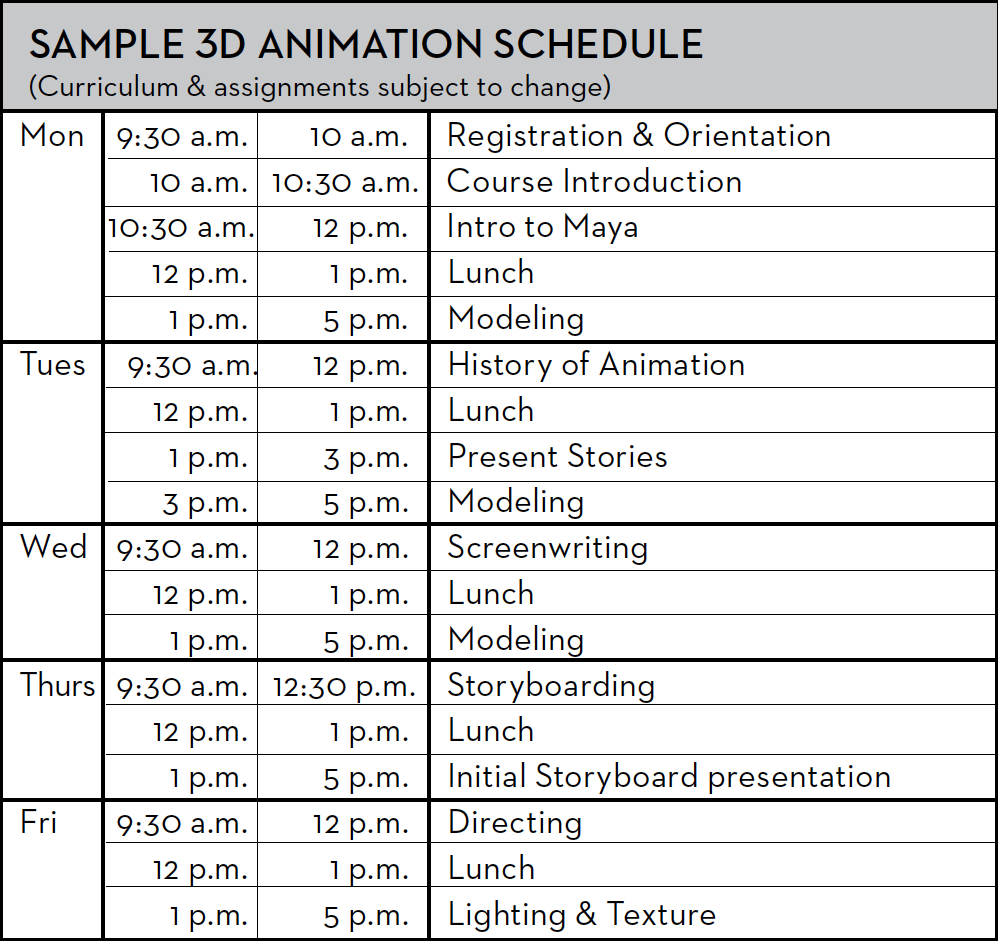Welcome!
Welcome to the New York Film Academy’s teen summer camps at Harvard University. The camp offers intensive, conservatory style workshops in Filmmaking, Acting for Film and 3D Animation. Whatever program you’re in, be ready to commit yourselves to an intensive, exhausting, exhilarating and creative process!
We ask that both parents and students read through this packet, which provides information that will prove invaluable in orienting yourselves to our program.
We look forward to seeing you this summer!
NYFA at a Glance
MISSION STATEMENT
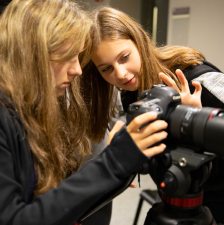 Through its educational programs, the New York Film Academy (“NYFA”) propagates visual literacy and visual storytelling through hands-on intensive learning. It seeks to make visual storytelling education accessible to the most diverse, international, and broadest possible spectrum of campers, and to hone the skills of future professionals so that they may one day serve the visual storytelling arts as industry leaders.
Through its educational programs, the New York Film Academy (“NYFA”) propagates visual literacy and visual storytelling through hands-on intensive learning. It seeks to make visual storytelling education accessible to the most diverse, international, and broadest possible spectrum of campers, and to hone the skills of future professionals so that they may one day serve the visual storytelling arts as industry leaders.
EDUCATIONAL PHILOSOPHY
NYFA Teen Programs are based on the philosophy of “learn by doing.” Every curriculum stems from that belief. NYFA believes that the most effective way for our campers to master their chosen craft is to immediately start creating their own work in a hands-on intensive working environment.
NYFA VALUES
Leadership – To be a successful artist in these collaborative fields, leadership qualities are important. Through the work and development of the projects that campers make or perform in, they can enhance their ability to engage others to work together and create impactful art.
Creativity – We encourage campers to think outside the box. The challenges inherent in these crafts force campers to develop creative solutions to achieve desired results.
Collaboration – Quality leadership and collaboration go hand in hand. To achieve educational and creative goals, campers must work together and often depend on their classmates’ assistance to execute their projects. Collaboration fosters the ability to conduct oneself with professionalism and respect to others and their creativity.
Discipline – The discipline required to create quality work is extraordinary. A camper will need to practice the art of discipline, and try their hand at a craft that requires full dedication to succeed.
Expression and Individuality – Through visual and performing arts, our campers have an extraordinary opportunity to express their point of view and discuss their thoughts, ideas and concerns. We encourage campers to use their own experiences to inform their work, which often results in truthful and moving storytelling.
OUR INSTRUCTORS
NYFA’s faculty members are active performing and visual arts professionals. They all have a passion for the arts including storytelling and teaching and are consistently given the highest praise from our campers.
STAFFING
The Director of Teen Programs supervises all Teen Program staff, which includes counselors, instructors and technical assistants. Questions regarding Camper Services should be directed to the Director of Teen Programs.
Registration
All NYFA camps have open enrollment, though NYFA prerequisites may apply. No previous experience is required. The application for the camps may be filled out online. A deposit ($500) is required to secure the camper’s spot in the program of their choice. Once the application and the deposit have been made, the camper will receive an online packet containing forms that must be filled out by the camper and their parents/guardians. Such forms include housing request, airport pick up and drop off, medical conditions or allergies, etc.
Online Forms
Parents and students will need to fill out and sign all required forms ONLINE. You will receive an email with the subject line “NYFA Summer Camp Action Required” with a personalized link. Please follow the steps to complete the forms.
Be sure to fill these out as soon as possible! If you have any questions, contact us at 212- 674-4300 or email [email protected]
Arrival
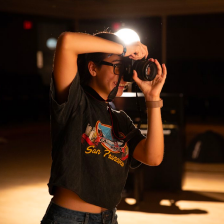 Commuting students do not have scheduled activities or classes on the Sunday start date of the program. Please see the Registration/ Orientation section for instructions on arrival.
Commuting students do not have scheduled activities or classes on the Sunday start date of the program. Please see the Registration/ Orientation section for instructions on arrival.
Students electing to stay in New York Film Academy housing may also utilize our airport transportation from Boston Logan International Airport(BOS) to our Harvard Dormitory. Please submit the Arrival & Departure form online as soon as possible with the indicated travel information if you would like to take advantage of this service.
Please book a flight to ARRIVE BETWEEN 10 a.m. and 3 p.m. on your arrival date!If you submit the Arrival & Departure form with flight information, a New York Film Academy counselor will greet you at baggage claim. Counselors will be wearing New York Film Academy t-shirts.
It is very important that you arrive and depart on the listed start date and end date for your camp. We are unable to accommodate transportation or housing on alternate dates.
Please submit the Arrival & Departure form online as soon as possible with the indicated travel information if you would like to take advantage of this service. NYFA transportation services is ONLY for students as space is limited. There is a one-time transportation fee of $50.00, which covers both pick-up and drop-off services.
3-WEEK PROGRAMS:Sunday, June 21 |
1-WEEK PROGRAMS:Sunday, June 21 |
If you choose to make your own travel arrangements from any airport, train station, or bus terminal to the dorm, or if you are arriving by car, please see the travel directions listed below.
From Boston Logan International Airport
The SL1 bus picks up and drops off at every Logan Airport terminal, with connections to the Red Line at South Station in downtown Boston. Take the SL1 bus to South Station Silver Line inbound and walk to South Station. Take the Red Line outbound to Harvard (this train is marked Alewife).
From Amtrak Train Station
South Station is the train’s final destination. The MBTA (“T”) stop is located outside the station. Take the Red Line INBOUND to Harvard. Follow directions from Harvard Station by referring to directions from Logan Airport.
PARKING
In general, parking in Harvard Square is in short supply. There is limited parking available in Harvard University parking lots within walking distance of our housing and classroom facilities.
The Harvard Square area of Cambridge is relatively compact, with nice stores, cafés, and restaurants within easy walking distance of our classrooms at Memorial Hall/Lowell Hall. Boston is only 15 minutes away by subway (although no students are allowed to travel there without adult supervision).
Registration & Orientation For Students Requiring Housing
3-WEEK PROGRAMS:Residential Registration: Sunday, June 21 |
1-WEEK PROGRAMS:Residential Registration: Sunday, June 21 |
Students who are living in the dorms will receive keys and room assignments during registration. A special orientation social for students only will be held at the residence and will take place the evening of registration around 6:00PM.
All students staying at the residence will join commuting students at the school for the main orientation on the first day of classes.
REGISTRATION, MOVE IN & ORIENTATION
Registration/Move-In hours are from 10:00AM to 3:00PM on the Sunday before your classes start. Registration will be held at our dormitory, Randolph Hall.
Registration should take no longer than 30 minutes. After registration is complete, students are free to explore campus (No student is allowed to leave the buildings alone. Buddy System – “Buddies” (two or more students) sign out together and sign back in as a group.
At 6pm ALL RESIDENTIAL STUDENTS will gather back at Randolph House for a mandatory orientation where food will be provided for resident students. Orientation will end by 7:15PM and students will have the option to be taken on a CVS run to purchase any snack or items that they need for their stay.
REGISTRATION / MOVE-IN ADDRESS:
To be determined
Parking is free in metered spaces on Sundays around the area.
Registration & Orientation For Students Not In NYFA Housing
Students who are NOT residing at the dormitory (that is, commuter students) will have registration and orientation on the first day of class, which will be on a Monday.
Location:
To be determined
3-WEEK PROGRAMS:First Day of Class: |
1-WEEK PROGRAMS:June 22, July06, July 20, July 27 9:00 AM |
Orientation will cover the course objectives, student supervision, class schedule, rules, and regulations. A question and answer session will follow. Most parents will not join the students for orientation but parents are certainly welcome.
Housing
To be determined
Please be sure to fill out the housing request form online even if you do not need housing!
You will have the opportunity to make a specific roommate request in the forms. Room assignments may not be changed. Payment for the dorm rooms should be made directly to the New York Film Academy. Housing is not guaranteed until the New York Film Academy confirms availability and the receipt of the housing payment.
We will take students on a shopping trip on their arrival day to purchase any snacks they wish to keep in their room.
2025 HOUSING PRICES
Please note: There may be a slight increase for 2026.
1-week shared room $1,470.00*
3-week shared room $4,252.50*
*Breakfast, Lunch and Dinner included in this pricing.
PLEASE NOTE:
In addition to the housing fee, a $250 room and key deposit is required.
YOUR CREDIT CARD WILL BE CHARGED FOR THE DEPOSIT. THE DEPOSIT IS REFUNDED IF THERE IS NO DAMAGE DONE TO THE ROOM AND ALL KEYS AND ACCESS CARDS ARE RETURNED.
All deposit refunds will be processed at the end of the summer and will be returned shortly thereafter.
SUPERVISION
There will be a staff of residential advisors living in the dorms and providing supervision. They also lead activities in the evenings for all programs and on weekends for programs longer than one week. There is always a residential advisor on duty. An RA hotline number will be given to you at registration and orientation.
No student is allowed to leave the buildings alone. “Buddies” (two or more students) sign out together and sign back in as a group. Students with cell phones are asked to have their phones charged and on at all times. If there are any questions regarding supervision, please feel free to contact us.
ACTIVITIES
On weeknights, residential students may participate in supervised activities such as sightseeing, game nights, seeing classic and new films at the theatre, or neighborhood tours. On weekends, our residential staff will lead the three-week students on excursions around the Boston area. These activities may include the New England Aquarium, exploring Boston’s North End, Boston Commons and Public Garden, or exploring the Museum of Science. For the more adventurous, there may also be biking and kayaking on the Charles River. Cambridge itself is a vibrant college town: dozens of restaurants, cafés, bookstores, ice cream shops, and pizza parlors encircle the university. All activities are included in housing prices.
FACILITY
To be determined
The dormitory is not air-conditioned.
The residence includes high-speed internet access, laundry room, and supervision by our residential staff.
Dormitories are designed and maintained for the accommodation of students. As should be expected with dormitories, the accommodations are utilitarian. It is suggested that participants bring a cell phone. Each student is allocated a bed, desk, chair, and dresser. Electrical appliances such as toaster ovens and hot plates are fire hazards and are not allowed. Such items will be removed from the student’s room. Halogen lamps are also not permitted in the dormitories, although incandescent or fluorescent lamps are acceptable.
The dormitory is a short walk from our classroom facilities. Be sure to bring an umbrella in case of inclement weather. Transportation to and from any evening/ weekend group activities will be provided.
DORM MEALS
Residential students will be provided 3 meals a day at Annenberg Dining Hall. All meals are included in the housing prices. Students may also choose to eat at any of the many dining options around the Harvard Square area, within a specific walking distance area. We utilize a buddy system and a strict check out and check in process with our staff. Students are never allowed to take any transportation without NYFA staff.
MAIL, PHONE, & INTERNET
If available, it is beneficial for students to bring cell phones. There are stores in the area to purchase SIM cards for international phones.
High-speed wifi is available throughout the residence as well as in the classrooms.
Any mail or packages must be addressed to Memorial Hall, not the dormitory.
“Student’s Name”
c/o New York Film Academy
Memorial Hall Room 027
Harvard University
45 Quincy Street
Cambridge, MA 02138
GETTING MONEY
We recommend that students set up an account with an ATM card instead of bringing large sums of cash. This has proven to be the safest, easiest way to transfer money, as well as to monitor spending. There are several ATM locations near the school & dorms within less than a 5 minute walking distance. Out of pocket expenses that arise (not including lunch, dinner and snacks) are souvenirs and laundry. Typically, $50/week is sufficient spending money in addition to the student’s food budget.
CLOTHING
The weather in Cambridge in the summer is usually warm and humid and the style of the summer camps is definitely casual. Shorts, casual pants, and t-shirts are acceptable. Light sweaters or jackets are suggested for highly air-conditioned classrooms and some cooler evenings. Students, however, may wish to bring something a little nicer to wear for their final graduation events. Students should bring running shoes, rain gear, sunglasses, sunscreen, etc.
TRAVEL
While we respect the maturity and intelligence of our students, they are still legally minors, and travel rules exist for their own protection.
Throughout the summer, we will be organizing evening and weekend activities for the overnight students. Trips will include forays throughout the Boston area. Students will periodically be taken as a group to stores (pharmacies, the grocery) to provide for their basic needs.
Teens in the Harvard University program are not allowed to travel outside of the Harvard Square area without an escort. Students who violate this rule risk expulsion without a refund.
CURFEW
Throughout the program there will be a building curfew at which time all students are required to be in the building. There will also be a room curfew at which time all students are required to be in their rooms.
ROOM & KEYS
No visitors are allowed into student dorm rooms, with the exception of family members (with approval from the residential advisor on duty), other NYFA dorm students, and NYFA staff.
* Commuting students are only allowed in the dorms while working on course projects during class hours and with prior authorization from the Campus Director or Director of Residential Life.
Keys: If you lose your key, there is a $60 charge for a replacement. Dorms will be checked by NYFA staff at check-out, at which time the key must be returned. Any damage will be documented and charged accordingly.
LEAVING THE RESIDENCE
Students who reside at the residence will walk 10-15 minutes to the classroom facility. Transportation will also be provided to and from any evening and weekend activities when necessary. Students staying at the residence who wish to leave to spend time with family must have a parent notify the residence director, whose contact information will be provided at registration and/or orientation. Notification can take the form of either a signed permission letter or an e-mail from a parent’s e-mail address that must be in our files.
Meals (COMMUTING STUDENTS)
Meals are not included in the tuition cost. During lunch period, students can explore the cafés and restaurants in the Harvard Square area. Within a five-minute walk,students can access everything from tacos to falafel, salads to sushi. Alternately right across the street from our classroom facilities in front of the Harvard Science Center are daily food trucks or commuter students are welcome to bring their own packed lunch.
For snacks and beverages during school breaks, eateries are across the street within the Harvard Science Center.
Getting There
Students who reside at the residence will walk to the classroom facility together. Transportation is provided to & from dorm evening/weekend activities. For commuting students, please make all transportation arrangements before the program begins. It is important that all students arrive on time every day (by 9 or 9:30 a.m. as set by the program schedule) and have transportation available to return home at the end of the day. Classes will generally end at 5:00 p.m.
All classes take place at Lowell Lecture Hall and Memorial Hall:
To be determined
Commuting by MBTA:
The Harvard Square stop is only a 5 minute walk to our classrooms on the opposite side of Harvard Yard.
Medical Care
If students find themselves in need of medical attention, they must immediately advise office staff or a residential advisor. Arrangements will be made to escort the student to the nearest medical facility.
Remember to fill out the medical information form online. Please scan or photograph the front and back of your insurance card, and upload it in the online forms, email, or mail it to us!
Please bring a supply of any prescription medicine you will need. Students are required to self-medicate.
Please inform us of any allergies you may have on the Medical Release Form (to be completed online).
We suggest you contact your insurance provider if you are unsure whether your policy covers you in Cambridge, MA.
Rules & Regulations
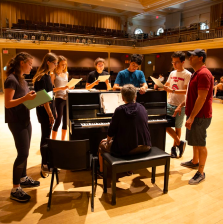 For a detailed list of rules, please see the Camper/Parent Handbook in the online forms. Remember, the form must be (digitally) agreed to by both parents and students!
For a detailed list of rules, please see the Camper/Parent Handbook in the online forms. Remember, the form must be (digitally) agreed to by both parents and students!
By signing, you acknowledge that you have read and agree to the rules set forth here. NYFA reserves the right to present additional rules/regulations at registration. These will be reviewed at orientation on the first day of the program. Please keep in mind that the rules exist to make sure that everyone is safe and that the programs run smoothly. Our rules have never prevented any student from having an incredible experience!
All film shoots are supervised by an adult teaching assistant. Excluding meals, at no time are students allowed outside of the school grounds without special consent from a parent or guardian.
The visual and performing arts are a collaborative field. Students are required to treat their fellow classmates, their teaching assistants and their instructors with the level of respect they expect to receive, themselves.
Students who are consistently tardy, irresponsible, or disruptive run the risk of being removed from the program. Likewise, intolerance shown in regards to race, ethnicity, religion, gender or sexual orientation may result in expulsion.
DRUGS & ALCOHOL ZERO TOLERANCE POLICY
Drugs and alcohol are strictly prohibited. Students found with drugs or alcohol in their possession will be immediately expelled from the program at their and/or their parents’ expense.
This includes procuring drugs or alcohol for someone else, even if you personally did not partake in their consumption.
There will be no exceptions. Expelled students will not receive a refund of any kind.
Departures
Commuting students finish the program on the last day of class (Friday). Residential students’ departure date is the last day of the program dates (Saturday). We cannot accommodate departures after your program’s end date. Residential students must check out of their room by 11 a.m.on their program’s end date.
Parents transporting students by car or traveling together by bus or plane should pick up their teen by noon on Saturday. Students flying alone will have the opportunity to utilize our airport transportation for their departure. Please be sure the departure flight information is provided to us in the Arrival & Departure form online. Please book a flight to depart no later than 3 p.m.on your departure date. All airport shuttles will depart no later than noon.
International Students & Travel/Visas
Campers should travel on a tourist visa or visa waiver* to attend the summer teen programs. When you enter the U.S., you should state that you are attending “SUMMER CAMP.” The camps are classified as recreational in nature and not academic, so student visas are NOT needed! You should not say you are coming to the U.S. for school! You are coming to CAMP!
Please make sure the camper’s passport is valid for at least six months past the intended departure date.Please note, if you are from a country where tourist visas or a visa waiver are not easily obtainable, then we can provide a letter to the consulate.
* VISA WAIVER
The visa waiver allows entry to the U.S. for up to 90 days without a visa for citizens of the following countries: Andorra, Australia, Austria, Belgium, Brunei, Chile, Czech Republic, Denmark, Estonia, Finland, France, Germany, Greece, Hungary, Iceland, Ireland, Italy, Japan, Latvia, Liechtenstein, Lithuania, Luxembourg, Malta, Monaco, Netherlands, New Zealand, Norway, Portugal, San Marino, Singapore, Slovakia, Slovenia, South Korea, Spain, Switzerland, Taiwan, and the United Kingdom.
Facts about the Visa Waiver:
Travelers must have a valid Electronic System for Travel Authorization (ESTA) approval prior to travel and meet all requirements. If you prefer to have a visa in your passport, you may still apply for a visitor (B) visa. The visa waiver CANNOT be extended. It is important not to overstay your visit or else you will not be able to use the visa waiver ever again. If you are planning a stay longer than 90 days, then you must apply for a tourist visa.
Important Contact Info
NY Office Number: 212-674-4300
NY Office Fax: 212-344-4434
NYFA Main Office Address:
New York Film Academy
17 Battery Place, 1st Floor
New York, NY 10004
General Questions:
Email: [email protected]
NYFA Website: nyfa.edu/summer
Prior to June 19, all questions should be directed to the New York office: 212-674-4300.
We will distribute our NYFA Harvard office number and other emergency contact numbers during orientation and we will also send a welcome email a week prior to the camp start date.
Checklist
Your tuition and housing balance are due 30 days before the start of your program.
- Confirm that your health insurance covers you in Cambridge, MA.
- Fill out housing, medical, arrival and departure and other forms online. You will do this by going to the link contained in the email sent to you.
- Residential students can ONLY arrive on the Sunday of their program start date. They MUST depart on the Saturday their program ends.
- Please note any allergies / medications on the medical Release form.
- Inform NYFA of any changes to your address, email or phone.
- Be sure to bring this packet with you to camp. You may want to make a copy of this as well for your parents to keep at home for reference.
- Please contact us with any questions or concerns.
Packing List
- Pillow, linens (extra long twin), comforter/blanket & towel(s)
- Warm weather clothing
- Comfortable shoes
- Sunscreen
- Rain gear
- Bathing suit
- Sweatshirts for the classroom/cool nights
- Water bottle (refillable)
- Notebook&pen/pencil
- Cell phone and chargers
- Universal adapter for international students
- Debit card or spending money
- Performers: clothing that is comfortable to move/dance in
- Filmmakers: an external hard drive if you want to save raw footage
- Other disciplines: see the next section for any particular items
WE LOOK FORWARD TO MEETING YOU THIS SUMMER!
Fun Fact
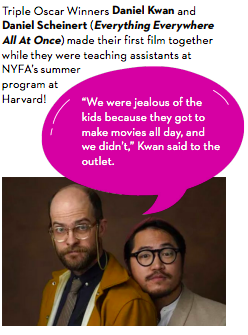 |
 |
That summer, Kwan and Scheinert became teaching assistants at New York Film Academy’s Harvard program … Kwan told The Boston Globe that the “camp counselor” experience pushed them to start collaborating artistically.
You can read the full article here
Preparation
We look forward to seeing the amazing work you will produce during your camp. Please read through the section designated for your program in the following pages. We have outlined information for you to best prepare for your camp.
FILMMAKING STUDENTS
Prepare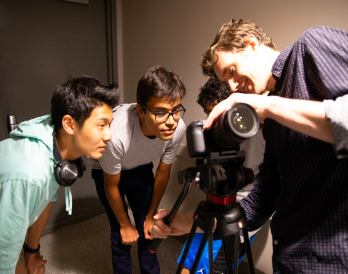 by writing any story ideas, character notes or other thoughts. While these ideas will evolve once the program begins, it will be a great help to have something prior to starting the workshop. Remember to think visually! Begin to consider music tracks you may want to incorporate into your final film.
by writing any story ideas, character notes or other thoughts. While these ideas will evolve once the program begins, it will be a great help to have something prior to starting the workshop. Remember to think visually! Begin to consider music tracks you may want to incorporate into your final film.
While there is no required reading, we have found the following books to be excellent resources: “Film Directing: Shot by Shot” by Stephen Katz, “The Art of Dramatic Writing” by Lajos Egri, The “Filmmakers Handbook” by Edward Pincus and Steven Ascher, “Making Movies” by Sidney Lumet and for screenwriting, Lew Hunter’s “Screenwriting 434”.
We suggest that students write a one-page outline of a one-minute story and bring this with them to the first day of class. This draft should have no dialogue, utilizing only visual and physical action. Students should be creative and keep the story simple. Students can use this story as a starting point for any of their projects.
Please come prepared, but with an open mind. Inevitably, ideas will develop as inspiration hits, and we encourage filmmakers to begin to write and now, during the program, and after. Story is one of the most important elements of film. Students should keep a diary and discuss ideas with friends. In class, instructors will help students translate their ideas into images. While students can write freehand in notebooks, it would be much easier to work on your scripts on a tablet or laptop. Bring one if you own one!
We will provide a flash drive to all students with their final project(s). However, if students wish to take home their raw footage and the films of their classmates, we highly recommend bringing a 16 GB USB flash drive or portable hard drive. Writing scripts that take minimal expense.
Filmmaking students may incur additional expenses for their own productions. These expenses may be for things like costumes or props. Please plan accordingly, and consider writing scripts that take minimal expense.
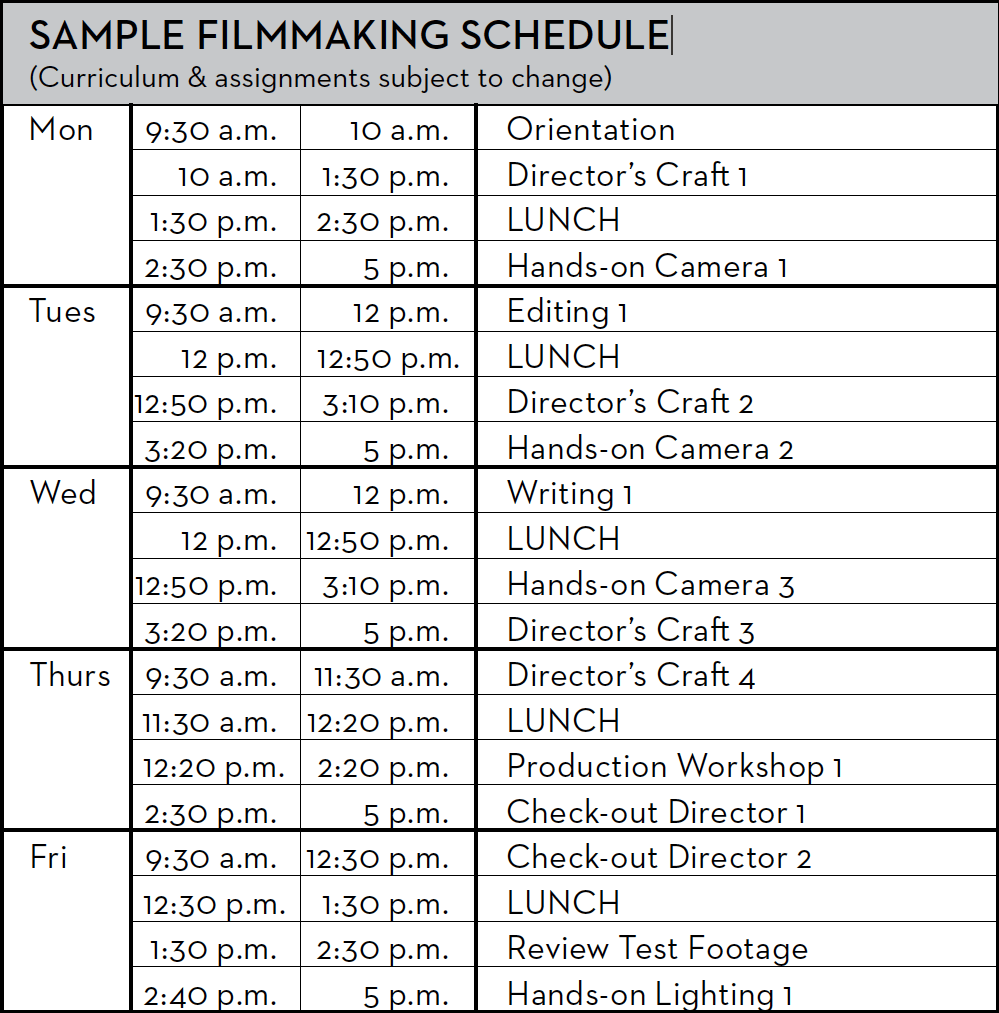
ACTING FOR FILM STUDENTS
Acting for Film students can prepare by watching their favorite actors, then reflecting on what it is about the performance that makes the actor so captivating. Students should note specific scenes that move them.
For books on acting and technique, feel free to look at: “Respect for Acting” or “A Challenge for the Actor”, both by Uta Hagen, “On Acting” by Sanford Meisner or “A Dream of Passion” by Lee Strasberg.
No experience is necessary to succeed in our acting for film workshops. However, you must come prepared to work in a collaborative and supportive environment.
Be prepared to expand your comfort zone and jump into new experiences. This is an exciting and personal program. Be ready to explore body movement, voice techniques, scene study, improvisations and of course, acting for the camera. All students should bring comfortable clothes that allow for a full range of motion.
Actors should bring a notebook and pen to every class.
On the first day, 3-week students may be asked to share a prepared monologue with the group and members of the faculty. Your monologue should be memorized and no longer than two minutes long.
There are a TON of monologue books and websites; if you simply Google “monologues” you will find access to all sorts of monologue databases. You may also find monologues from a play or movie you particularly enjoy. Your local bookstore will probably have several monologue books.
If you are having trouble finding a monologue, we will provide a generic monologue to everyone a few weeks prior to your first day.
Students in the 1-Week program will not need to prepare a monologue. You can bring a monologue you would like to work on throughout the program, but be mindful that instructors may also assign specific monologues due to the brevity of the 1-Week camp.
At the completion of your program you will be provided with a google drive link to your final monologue and/or scene. We highly recommend that 3-Week acting students bring a USB flash drive (at least 16 GB) onto which they can upload all of their raw footage and filmmakers’ projects.
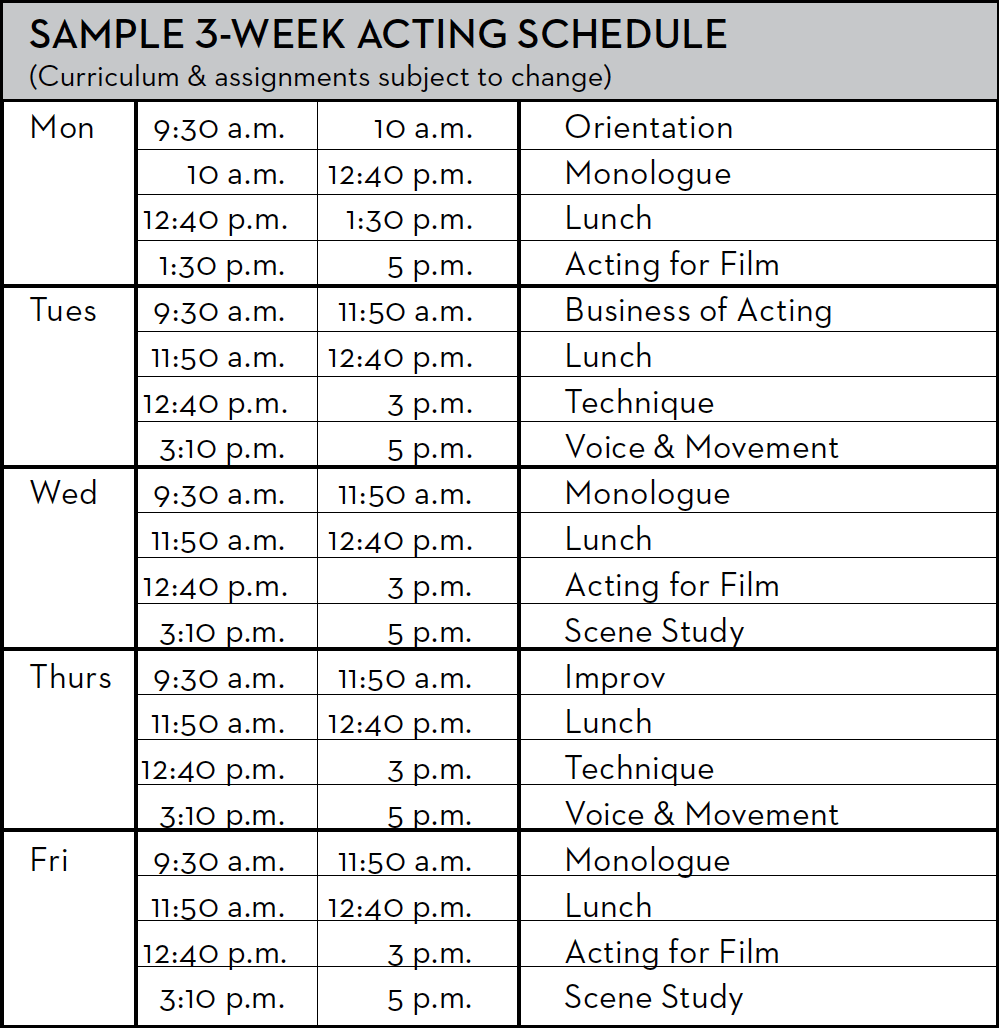
FIRST DAY
We’re going to jump right in on the first day! Students in the 1-Week program will not need to prepare a monologue. You can bring a monologue you would like to work on throughout the program, but be mindful that instructors may also assign specific monologues due to the brevity of the 1-Week camp.
We’d like to ask all of the 3-Week students to prepare a monologue to share with the group and members of the faculty on day one. Your monologue should be memorized and no longer than two minutes long.
There are a TON of monologue books and websites; if you simply Google “monologues” you will find access to all sorts of monologue databases. You may also find monologues from a play or movie you particularly enjoy. Your local bookstore will probably have several monologue books.
Please DO NOT write your own monologue or improvise on the first day. If you are having trouble finding a monologue, we will provide a generic monologue to everyone a few weeks prior to your first day.
3D ANIMATION
While this is a computer 3D animation class, any visual arts skills will be useful for the course. Students may want to practice drawing and shading before the program begins, and should all bring sketchbooks to class. A working knowledge of Photoshop will also be useful (though not required).
Animators are filmmakers, so any reading on film can help students prepare for the visual requirements of directing. We recommend “Film Directing: Shot by Shot” by Stephen Katz, as well as the other books mentioned in the Filmmaking section above.
For animation-specific reading, we recommend Richard Williams “Survival Guide for Animators”. Students may enjoy watching Chuck Jones’ Bugs Bunny shorts, to understand humor and pose-to-pose animation. We also recommend that students watch anything from Pixar!
We highly recommend that 3D animation students bring a hard drive (at least 1TB) onto which they can upload all of their projects. If students plan to use this hard drive to edit at home, they should bring a professional-level brand (G-Tech, LaCie, and Seagate are proven ones).
For students interested in exploring digital drawing and animation, optionally, a tablet (such as an iPad or Surface tablet) and stylus can be beneficial. Additionally, if they choose to work on 2D animation, having a drawing app they are comfortable with that allows file export to .psd or .png formats can enhance their creative process.
